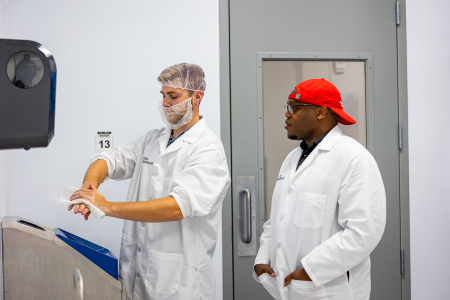NCFIL Boasts Culture of Safety

At the North Carolina Food Innovation Lab (NCFIL), food innovation is our passion, and food safety is our top priority. Like any manufacturer, we do our best to ensure the safety of our employees and our clients and their consumers.
NCFIL’s Food Safety Manager, Robert Price, leads the charge when it comes to safety. He helped create NCFIL’s training programs and facilitates yearly Food Safety training for every employee. He also coordinates yearly inspections, handles incident reporting and reviews, and ensures ongoing safety regulations are being met.
Promoting General Safety throughout the Facility
All employees who come to work onsite are required to go through Environmental Health and Safety (EHS) training with Allison Stockweather, EHS director for the UNC System partners at the NC Research Campus. Employees receive onboard training for emergency situations and natural disasters, as well as what to do in case of contact with hazardous materials or injuries that require medical attention.
From there, employees undergo NCFIL’s own training program that goes in-depth with the physical, chemical, and biological hazards specific to work at NCFIL. This focuses on particular equipment safety, such as a review of sharps hazards since employees deal with knives and other sharp tools; proper lifting techniques; and required Personal Protective Equipment (PPE) in different areas of the facility, such as lab coats, various types of gloves, and hair and beard nets.
“PPE training is required by law; it’s critical to ensure the people making the food, and the food itself, are free from any hazards,” says Price.
Price handles investigations and reporting for any instances that happen in the facility. He directly interacts with the person(s) involved and creates solutions to prevent future instances.
“Last year, someone slipped and fell in the Pilot Plant. The person was okay, but the report brought to light some corrective actions needed at that time. I emailed the team to review proper work boots and reminded them about no standing water in the facility and not moving too quickly,” Price adds.
Establishing and Verifying Laboratory Safety
NCFIL’s laboratory safety protocols are based off of the FDA’s Good Laboratory Practices. Each person who works in the lab is trained on proper PPE and chemical safety.
“We worked with NC State’s EHS department to ensure all chemicals are authorized for use in our facility and are contained in the proper manner to prevent any spills or potential hazards,” says Price. “We’re responsible for creating a Lab Safety Plan for NCFIL and keeping it and our chemical inventory up-to-date.”
NCFIL’s Lab Safety Plan includes a Standard Operating Procedure (SOP) for every procedure and every piece of equipment.
“Many procedures in our facility are performed on a regular basis. The person responsible for completing the procedure is responsible for creating an SOP, using our template for consistency. We keep them on file, accessible either electronically or right next to the relevant equipment. We have over 50 SOPs in place and are still creating more,” Price says.
NC State Environmental, Health, and Safety visits once a year to do safety inspections. Inspectors review the safety plan, equipment inspection and maintenance records, and employee training cycles; check the chemical inventory to ensure compliance; and walk through the Quality Control Lab and Pilot Plant to look for chemical and physical hazards.
Ensuring Food Safety
NCFIL is guided by current Good Manufacturing Practice (cGMP) and the Food Safety Modernization Act regulations, which are the quality and safety regulations enforced by the FDA. While there are some general procedural, process, and documentation guidelines all manufacturers must adhere to, others vary based on the facility and commodities being manufactured.
For a food lab such as NCFIL, a Food Defense Plan is necessary. All employees wear ID badges that allow them access to certain areas, and all visitors must sign in at the main office. A cleaning station at the main entrance of the Pilot Plant and boot scrubber mats at multiple entry points to the Pilot Plant and Test Kitchen reduce the chances of solid materials and bacteria, such as listeria, from getting into production facilities.
Another important precaution is keeping food allergen ingredients separated in designated areas. For example, soy protein or flour, wheat flour, and gluten-free sources of flour are stored separately. Egg white protein is carefully labeled in consideration of plant-based or vegan commodities. Allergen detection kits are used to check equipment for traces of allergens after it’s cleaned.
Price also handles traceability and recalls, two critical safety measures, for the facility. “Food ingredient specifications and traceability allow us to know exactly what we are handling and if there is anything hazardous with the ingredient itself. If we don’t know the ingredient’s chemical analysis, we could hurt our customers or ourselves,” he says.
“We also trace where we receive ingredients and verify through supplier verification documentation that we received ingredients that fall within the acceptable range of potential hazards, such as E. coli or heavy metals, for example. It’s mandatory to have this information to determine our next steps in case the supplier issues a recall.”
Work With Us
We’ve established a culture of safety in order to best serve our clients. From established food companies to growth-phase entrepreneurs, we want to bring your plant-based idea from concept to market, safely of course! Reach out today, and let’s get to work.
- Categories: